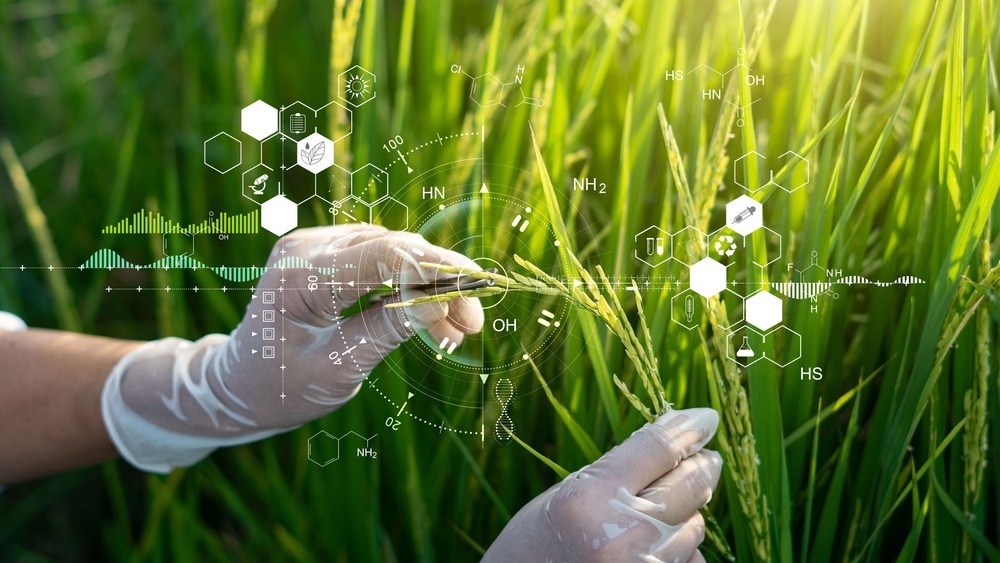Advances in genomic tools have transformed modern agricultural techniques through changes in breeding, precision agriculture, and sustainability. Despite its recent emergence, agrigenomics is revolutionizing practices, which will likely play a key role in stabilizing food security in the coming years.

Image Credit: PopTika/Shutterstock.com
The Role of Agrigenomics in Advancing Crop and Livestock Breeding
Agricultural genomics, or agrigenomics, refers to the use of genotyping and next-generation sequencing technologies to study agricultural species. The focus of agrigenomic research is the understanding of genetic variation linked to desirable traits in crops or livestock to inform cultivation and breeding decisions. In turn, harnessing targeted traits can help increase the stress tolerance of crops, increase productivity, and contribute towards more sustainable methods of production.
Agrigenomics has provided farmers and livestock breeders with the ability to identify and select for specific genes. This has revolutionized crop breeding since individuals can be selected for desirable disease resistance, drought tolerance, and increased yield. In turn, this allows for improved crop varieties that are more resilient, productive and adapted to diverse environmental conditions.
A 2017 study by Wang et al. discusses the four major areas of agrigenomic research. This includes comparative genomics for plant breeding, transcriptome analysis for plant breeding, genotyping and marker-assisted breeding, and recombinant DNA technology. These areas demonstrate the trajectory of agrigenomic research focusing on the identification, modification, and application of genetic-driven breeding on increasingly broader scales.
An example of the scale to which agrigenomics can be applied was a study by Ma et al. (2015), in which researchers described a genome-wide association study of global recombination rate in nearly 3,224 males and 53,125 female Holstein cattle. Findings showed that males have more recombination than females and that the male recombination rate may have decreased in the last 40 years.
Using genotype data, researchers mapped the present and historical patterns of genetic variation in this cattle species, providing a key baseline to understand the genetic merit (i.e., value as parents of the future generations) for this species.
Precision Agriculture and Genomic Tools: Revolutionizing Farming Practices
The rise of parallel technological innovations and their application in agriculture has contributed to the success of agrigenomics. For instance, agrigenomics combined with precision agriculture techniques provides a targeted approach enhancing overall farming productivity. Specifically, combining genomic information with real-time data on soil composition, weather patterns, and crop performance can inform decisions about optimal planting, fertilization, irrigation, and pest control strategies.
A 2016 study by Vural Özdemir and Eugene Kolker discussed how so-called ‘omic’ systems sciences and high-throughput technologies have contributed towards the potential emergence of Precision Nutrition 4.0. Agrigenomics, nutrigenomics, nutriproteomics, and nutrimetabolomics are interconnected fields that may revolutionize agricultural practices to focus on maximizing nutrition and productivity. However, despite its potential innovative capacity, applying all four fields into a holistic system has yet to be achieved.
Nonetheless, the study by Özdemir and Kolker provides suggestions for Precision Nutrition 4.0, combining all four -omic fields. Authors suggest focusing on converging common elements across fields, using empirical data-based systems to overcome challenges, and building “nested innovation ecosystems.” Nonetheless, the combination of agrigenomics with other technological tools is already contributing to advances in crop breeding, productivity, and sustainability.
Harnessing Agrigenomics for a More Sustainable Future
The application of genomic tools has environmental implications since agrigenomics can be used to promote sustainable agriculture and mitigate environmental impacts. For instance, the identification and selection of genes related to nutrient utilization or environmental stress tolerance can contribute towards more resilient, less energy-dependent cops. Moreover, agrigenomics can develop crops used for biofuel, contributing to the expansion of sustainable farming systems and the transition towards a greener future.
Abberton et al. (2015) discussed the potential of genomics in the shift towards more sustainable agricultural practices. The authors present the use of genomics to increase crop yield, quality, and stability of production through breeding strategies, enhancing the resilience of crops to climate variability, increasing the productivity of crops, and broadening the range of crops to diversify the food supply.
The study presents how modern agriculture is undergoing a shift towards more sustainable practices away from the energy and resource-intensive monocultures dominating current agriculture.
Agrigenomics is shaping farming practices by changing crop breeding techniques, improving precision agriculture practices, and promoting sustainable farming methods. By harnessing the power of genomic tools, producers can enhance crop productivity, reduce input waste, and contribute to a more resilient agricultural sector. Ultimately, the integration of emerging technologies, such as genomic tools, has extensive potential to transform agricultural practices and contribute towards more sustainable food production.
Sources
- Abberton, M. T., Batley, J., Bentley, A. R., et al. (2015). Global agricultural intensification during climate change: a role for genomics. Plant Biotechnology Journal, 14(4), 1095–1098. doi:10.1111/pbi.12467
- Decker, J. E. (2015). Agricultural Genomics: Commercial applications bring increased basic research power. PLOS Genetics, 11(11), e1005621. doi:10.1371/journal.pgen.1005621
- Ma, L., O’Connell, J. R., VanRaden, P., Shen, B., Padhi, A., Sun, C., Bickhart, D. M., Cole, J., Null, D., Liu, G. E., Da, Y., & Wiggans, G. (2015). Cattle Sex-Specific Recombination and Genetic Control from a Large Pedigree Analysis. PLOS Genetics, 11(11), e1005387. doi:10.1371/journal.pgen.1005387
- Özdemir, V., & Kolker, E. (2016). Precision Nutrition 4.0: A Big Data and Ethics Foresight Analysis—Convergence of Agrigenomics, Nutrigenomics, Nutriproteomics, and Nutrimetabolomics. Omics a Journal of Integrative Biology, 20(2), 69–75. doi:10.1089/omi.2015.0193
- Wang, W., Cao, H. X., Miclăuș, M., Xu, J., & Xiong, W. (2017). The promise of agriculture genomics. International Journal of Genomics, 2017, 1–3. doi:10.1155/2017/9743749
Further Reading
Last Updated: Nov 23, 2023